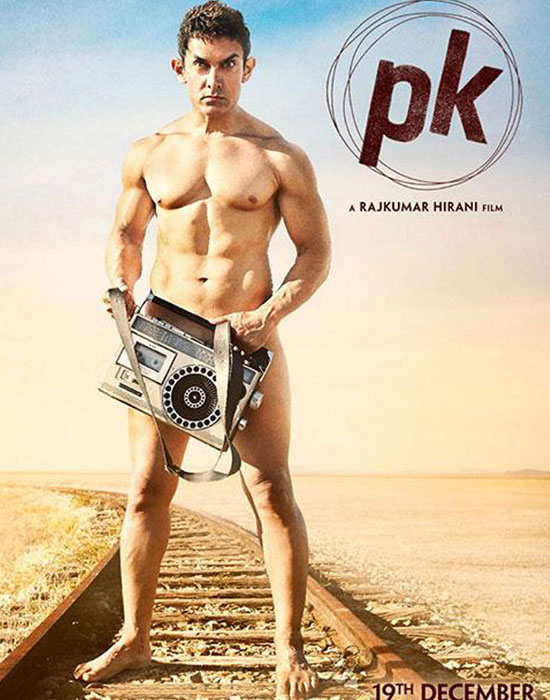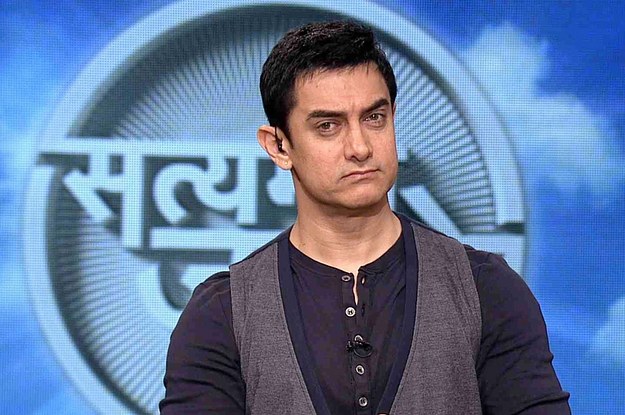When Aamir Khan got into trouble for saying it’s okay to be gay
In a country already overpopulated with homophobic, narrow-minded and traditional folk obsessed with marriage, children and match-making, homosexuality definitely deals a definitive blow. If it’s not the misunderstanding doing the rounds that people of the LGBT community are unnatural and perverse, it is that homosexuality is an effect of Western culture and can be cured with a few basic yogic asanas or worse, through shock therapy. With religious leaders standing sentinel on one side and the 1860 outdated colonial laws caging in on the other, being gay in India definitely is not something you can be happy about.
“When you are told every single day that you are useless, it begins to drag you down,” said Simran, a member of the hijda community on Aamir Khan’s iconic show, Satyamev Jayate that aired recently on October 19. Discussing alternative gender identity, Aamir began the show with a disclaimer that the topic (always only revealed during the show) was one that was sensitive; and urged his viewers to use their own intelligence to judge what he was going to be talking about.
The show went on to interview Gazal, Deepak and Simran; all persons with alternate gender identities who had had to fight a lot of social pressure to get where they were today.
Towards the end of the show, Aamir discussed Section 377 of the Indian Penal Code, which says that a same gender sexual relationship is against the order of nature and is an offence.
In July 2009, The section had been declared unconstitutional with respect to sex between consenting adults by the High Court of Delhi on 2 July 2009. Unfortunately, 4 years later in December, the judgement was overturned by the Supreme Court of India. Despite protests from famous people in Bollywood and the business industry, the courts continue to ban homosexuality. Celebs like Imran Khan , Celina Jaitley, Twinkle Khanna, John Abraham, Karan Johar, Farhan Akhtar, Riteish Deshmukh, Shruti Haasan, Sonam Kapoor, Anushka Sharma and even Amitabh Bachchan raised their voices to scrap the ban. At this time, Aamir was quoted saying, “I am most disappointed with this judgement. It feels very intolerant and violative of basic human rights. It’s a shame.”
 A very obvious impact of a colonial hangover, section 377 has long been removed in Brittan as a law, but continues to be followed today in India. No matter that several historians, Gore Vidal in particular) suggested that there has always been, more or less, a constant 10 to 15 percent of males that have preferred their own gender. Apart from persons from the LGBT community Aamir called upon Dr. Anjali, who assured the Indian public that one, like a heterosexual can’t become a homosexual, neither can a homosexual become a heterosexual. Choice did not play a role in it. Secondly, she added that despite what the law said, homosexuality was a natural phenomenon that occurred during birth.
A very obvious impact of a colonial hangover, section 377 has long been removed in Brittan as a law, but continues to be followed today in India. No matter that several historians, Gore Vidal in particular) suggested that there has always been, more or less, a constant 10 to 15 percent of males that have preferred their own gender. Apart from persons from the LGBT community Aamir called upon Dr. Anjali, who assured the Indian public that one, like a heterosexual can’t become a homosexual, neither can a homosexual become a heterosexual. Choice did not play a role in it. Secondly, she added that despite what the law said, homosexuality was a natural phenomenon that occurred during birth.
Aamir went on to conclude the show by calling upon representatives from Voices Against 377, Hamsafar Trust and Naz Foundation to discuss the finer points about the law that wrongly, in fact termed the natural phenomenon of homosexuality as unnatural and therefore made it illegal. Never mind that the law hadn’t incriminated anyone for the last two decades—it was still a violation of Human Rights and put anyone from the LGBT community at a disadvantage. Following the usual format of the show, Aamir signed off by asking viewers to vote if they desired Section 377 to be repealed.
What happened on November 2, ironically proved how badly the country needed this law repealed. Homophobic to the core, a Chandigarh court issued a legal notice to Aamir seeking his response by 19 December on a petition alleging that he promoted homosexuality. Aamir was accused by the lawyer of being in contempt of court.
Surely, as the world’s biggest democratic country, the freedom of speech outweighs any other freedom? Where do we get off, calling our self a democracy if courts slap legal notices on us just because we ask people to voice their opinions? Laws are, after all supposed to protect, not target individuals who aren’t harming anyone else. Instead, it now seems that we are just a democracy where laws are not made based on the cultural mores or opinion’s of the people, but what a few powerful political and religious people think. Last time we checked, that was not the definition of a democracy.
Yet, in her petition, Kaur has claimed that Aamir has violated the Supreme Court order on homosexuality, upholding Section 377 which criminalises homosexual acts. According to Kaur, she had sent a legal notice to the Bollywood star on the same day of the show, asking him to apologize unconditionally. This was ignored by Aamir Khan and therefore Kaur took the next step.
Undoubtedly, Aamir is a shaper of public opinion and seeing celebrities like him support the cause of homosexuality will create a mindset change and influence at least a certain amount of people. Kaur was probably disturbed not just by what Aamir was saying, therefore, but because he was saying it on his popular TV show and, let’s face it, because he is Aamir Khan.
So, does he not have the freedom of speech just because he is famous? While politicians will happily rope in celebs when it works for them, is it right for the State to penalize Aamir because he was motivated enough to do something to improve the country? As we all know, improvement requires us to be critical and; like in Aamir’s own words, “unveil the curtain that has covered the things we don’t wish to see or talk about, preferring them to be hidden and never addressed.” Aamir began the show by mentioning he wishes to discuss these afore mentioned topics openly instead of ignoring them altogether, as has been done for so long.
As for those like Baba Ramdev who claim that homosexuality is not a part of Indian culture, we urge them to look into records like the Kama sutra, where homosexuality was seen as natural. That is, before India was colonized and Section 377 was set up along with several other draconian laws. A classic written in the first millennium, Kama sutra by Sage Vatsyayana, has a whole chapter on homosexual sex saying “it is to be engaged in and enjoyed for its own sake as one of the arts.” It also describes men who desire men to belong to a “third nature” and mentions oral sex and long-term unions between men.
What we would like to ask, is if the laws on the salaries of MPs have changed with inflation and the growing economy, why haven’t outdated laws with regards to homosexuality changed along with thoughts and opinions of society?

